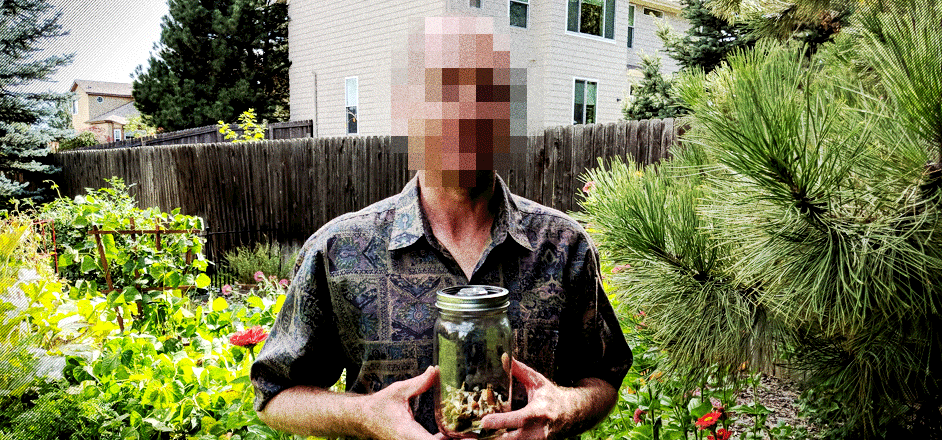Campaigns in Colorado and Oregon are gathering signatures and raising money to legalize psychedelic mushrooms.
Burners, ravers and old Pink Floyd fans cheer them on.
But if you want a medical reason for why mushrooms matter, drive to an upper-middle-class Denver suburb, near a greenbelt and grassy playground, and visit the home of "Jerry," a 54-year-old former salesman and father of two. As he greets you at the door, Jerry has an edgy restlessness, a weary hollowness, that befits a guy who, like tens of millions of Americans, spends much of his day dealing with chronic discomfort.
In his den, piles of X-rays show the non-cancerous tumors that snake up his spine and into brain. They put pressure on his nerves; pain and numbness radiate down his limbs.
In a basement bathroom, Jerry grows his favorite treatment. Giant tubs are filled with a brown substrate, white filaments weaving through. Dozens, maybe hundreds of "points" poke out: these are the heads of mushrooms. "Golden teacher and Burma yangon," Jerry says, smiling.

Jerry is one of an unknown number of Americans using psychedelic mushrooms not to trip out, but to treat pain.
Once a week or so, Jerry eats a small handful — two to five dried grams — and hangs out by his giant stereo, or in his large backyard with his dogs and flowers.
For days afterward, there's relief.
"It is astounding," Jerry says. "I feel fantastic."
Mushrooms also make him feel better mentally, Jerry says.
There's no good scientific explanation for why shrooms should treat pain. But shrooms-treat-pain anecdotes are at least a decade old, and there are now whole conferences about how LSD and mushrooms treat headaches, and online reports about mushrooms fixing nerve pain like Jerry's. Scientific papers are beginning to recognize these cases.

Because he's so sympathetic, Jerry is one of the poster children for Decriminalize Denver, the volunteer effort gathering signatures for the May 2019 city election. If it passes, cops wouldn't be allowed to use city resources to prosecute mushroom growers or users.
Jerry doesn't live in Denver proper, so a law change wouldn't affect him. But campaign leaders point reporters toward Jerry. And in a country bathed in opioids, antidepressants, and dread, Jerry's hopeful story is being received like a ray of sunshine through a narrow chink into a darkened room.
"Jerry is one of the millions of people who could really use access to magic mushrooms without having to worry," says Kevin Matthews, head of the Denver campaign; Matthews says mushrooms treated his own depression. "At this point, it's on the prohibitionists to explain why they should still be illegal."
Jerry originally agreed to let Rooster use his full name and picture. Later, he asked us to obscure his identity — not because he's afraid of the cops, he says, but because he and his family are afraid his insurance company could object and cut off his disability checks he's been getting for decades.
Living with these tumors for the past 12 years, Jerry says mushrooms were his last resort.
"Doctors couldn't do shit for me," Jerry says. Huge doses of opioids left him foggy. A nerve pain medicine, "made me insane," Jerry says. He thought about killing himself.
Then, Jerry read about the health benefits of psychedelics.
He wasn't new to shrooms. As a young man in the 1970s, Jerry picked psilocybe cubensis that grew naturally off cow patties in a field near his house in the American South. He probably tripped 200 times back then, he says — just for fun. He stopped in the '80s.
About eight months ago, Jerry tried shrooms again.
Jerry's wife says she sees a change in him for five or six days afterward.
"The mushrooms make it easier for him to realize that everything's ok, to let it go," says Jerry's wife. She says she's never tried mushrooms. "We've been going through this for so long it's like, ok, whatever works."
Jerry's life is very mushroom-centric. In his fridge, jars of mushroom tea are labeled "Dad's medicine." And, in a cupboard, a half-gallon mason jar is filled with caps and stems. And in his basement, three-foot tall speakers sit near a wall of CD's Jerry listens to while he's tripping. Yes, there are lots of Pink Floyd albums.





Leave a Reply